|
|
|
Sort Order |
|
|
|
Items / Page
|
|
|
|
|
|
|
| Srl | Item |
| 1 |
ID:
124860
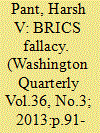

|
|
|
|
|
| Publication |
2013.
|
| Summary/Abstract |
Even as the BRICS member states come to terms with a rising China and even if they get their economic act together, the group will not be able to turn into a unified political force: a fundamental contradiction lies at the very heart of BRICS as a political idea.
|
|
|
|
|
|
|
|
|
|
|
|
|
|
|
|
| 2 |
ID:
090065
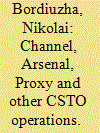

|
|
|
|
|
| Publication |
2009.
|
| Summary/Abstract |
The Organization provides an effective format for active joint efforts in countering drug trafficking, illegal migration, organized crime, and other outstanding problems. Effective mechanisms have been created to coordinate national efforts - e.g., CSTO auxiliary bodies comprising the heads of relevant national agencies, coordination councils on countering drug trafficking, illegal migration and emergency situations, as well as working groups of experts as part of the Security Council Secretaries Committee on matters of IT and security policy, and the fight against terrorism and extremism.
|
|
|
|
|
|
|
|
|
|
|
|
|
|
|
|
| 3 |
ID:
132495
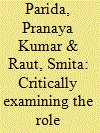

|
|
|
|
|
| Publication |
2014.
|
| Summary/Abstract |
Each day, natural disasters such as ?oods, earthquakes and hurricanes/ cyclones threaten human life and cause severe environmental losses around the world. During the last decade, disasters have affected the lives and assets of almost 2.4 billion people across the world (OCHO, 2010). In India alone since the year 2000, an average 65 million people have been affected by disasters every year. Of this, 8.45 million have been children under the age of ?ve and 3.25 million are pregnant and lactating mothers (UNICEF). Such
humanitarian crises often set back the developmental gains of lesser developed regions by several" decades. Not only do disasters lead to the loss of life and property, but "the immediate a?ermath is a complex situation complicated by issues of logistics, search and rescue, relief distribution, limited accessibility to some of the affected areas, the threat of secondary disasters, the mostly well-intentioned interests of diverse stakeholder groups (which many a times are external to the context of thedisaster), the in?ow of aid material and grants, political interest, media interest and often limited administration capacity. Government is responsible for administrative arrangements dealing with disasters.- Effective policies play a vital role in mitigating the impact of disasters and reducing likely losses of life and property ( Erramilli, 2008) . The disaster management, which is not being treated as a sector by itself, is
undergoing major changes, especially at the institutional and policy levels, which are prompted by various. macro-level factors ( Wagle and Warghade, 2006). Effective coordination among various stakeholders, specifically the Government, the international community and nongovernmental organizations (NGOS) in the aftermath of a disaster is critical to, among other things, a minimization in disaster response time, the proper allocation of resources and the avoidance of duplication of response efforts; Moreover, as economic growth and sustainable development are essential to successful disaster preparedness and mitigation efforts, effective coordination has the potential to strengthen the link between emergency response, preparedness and long-term development strategies.
|
|
|
|
|
|
|
|
|
|
|
|
|
|
|
|
| 4 |
ID:
114787
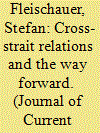

|
|
|
|
|
| Publication |
2012.
|
| Summary/Abstract |
The article focuses on the new policy platform in Taiwan of economic liberalization toward the Chinese mainland. The policy has been the source of both expectation and anxiety. While some observers believe that this will lead to cross-Strait prosperity and peace, others worry about Taiwan's de facto sovereignty and a potentially negative economic impact. In particular, it is claimed that the liberalization process will lead to political integration. The author offers a perspective from the European integration process and argues that integration between China and Taiwan will serve to elevate mutual trust and predictability.
|
|
|
|
|
|
|
|
|
|
|
|
|
|
|
|
| 5 |
ID:
130962
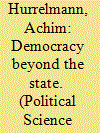

|
|
|
|
|
| Publication |
2014.
|
| Summary/Abstract |
MODERN DEMOCRACY IS, ABOVE ALL ELSE, a procedural ideal. To be sure, high substantive hopes are often placed in democracy. Yet the essence of democracy lies not in the specific outcomes that it may (or may not) help reach, but in a set of procedures that ensure, in the words of Philippe Schmitter and Terry Karl, that "rulers are held accountable for their actions in the public realm by citizens," who act primarily "through the competition and cooperation of their elected representatives."1 Historically, the main political arena in which democratic procedures have been implemented, and the main reference point for democratic theory, has been the state. According to a well-established argument, the democratization of non-state entities-such as international and supranational organizations or transnational networks with various degrees of institutionalization-is therefore faced with significant conceptual and practical challenges.2 This article seeks to assess the severity of these challenges: Can democratic procedures be transferred to political entities "beyond the state," or is democracy doomed to failure in non-state contexts?
|
|
|
|
|
|
|
|
|
|
|
|
|
|
|
|
| 6 |
ID:
132516
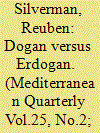

|
|
|
|
|
| Publication |
2014.
|
| Summary/Abstract |
The confrontation between Turkey's Justice and Development Party (AKP) and media mogul Aydin Dogan illustrates a major shift that has occurred in Turkey since the early 2000s. Dogan Holding is part of a traditional economic elite dominated by a number of large, coastal firms. The AKP is supported by a new generation of businessmen from Anatolia. This essay uses the conflict between the two to spotlight the competing networks of businessmen and politicians that dominate present-day Turkey.
|
|
|
|
|
|
|
|
|
|
|
|
|
|
|
|
| 7 |
ID:
130940
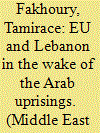

|
|
|
|
|
| Publication |
2014.
|
| Summary/Abstract |
Lebanon is a multisectarian state in which Muslim and Christian groups share political power. The executive elite is composed of a Maronite president, a Shiite speaker of parliament and a Sunni prime minister. The legislature is split 50-50 between Muslims and Christians, and communities enjoy educational and religious autonomy. Two pacts act as regulatory frameworks for these political arrangements: the 1943 National Pact and the 1989 Taif agreement, which put a halt to Lebanon's 15-year civil war (1975-90).
While Lebanon's prewar political system (1943-75) was often framed as a paradigmatic case of consociational or power-sharing democracy,1 most observers today agree that this system is an anarchistic model for the devolution of power. 2 Sectarian3 politics feeds on patronage ties and foreign alliances through which communities vie for control over resources. It further reifies partisanship in external conflicts.
|
|
|
|
|
|
|
|
|
|
|
|
|
|
|
|
| 8 |
ID:
130939
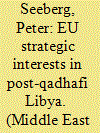

|
|
|
|
|
| Publication |
2014.
|
| Summary/Abstract |
Since the fall of Muammar Qadhafi in 2011, a legitimate monopoly over the means of violence has not been in the hands of the Libyan state. The military confrontation between the regime and what the international media called the "rebels," supported by the NATO no-fly zone, ended in October 2011. However, in 2012 and especially in 2013, Libya witnessed an escalating conflict pitting the democratically elected government and the Libyan state against armed groups and militias. For the EU, this is a challenge to its strategic interests, primarily security in the Mediterranean and secondarily migration and the development of Libya.
|
|
|
|
|
|
|
|
|
|
|
|
|
|
|
|
| 9 |
ID:
133752
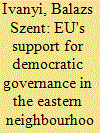

|
|
|
|
|
| Publication |
2014.
|
| Summary/Abstract |
The European Union seems to place an increasing rhetorical emphasis on harnessing the transition experience of the new member states. This article examines whether the EU actually makes use of this experience in its promotion of democratic governance in the eastern neighbourhood. The main conclusion is that while reform priorities of the EU in the region are aligned with transition experience, the actual participation of actors from the new members in implementing EU-financed projects aimed at promoting democratic governance is limited. This contradiction should be resolved or it will further erode the credibility of the EU's external policies.
|
|
|
|
|
|
|
|
|
|
|
|
|
|
|
|
| 10 |
ID:
129000
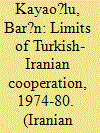

|
|
|
|
|
| Publication |
2014.
|
| Summary/Abstract |
Why did Turkey and Iran fail to become close partners in the 1970s even though they had compelling reasons to do so? This article argues that mutual distrust between Turkish and Iranian leaders, domestic turmoil in the two countries, and diverging geostrategic priorities undermined Ankara and Tehran's efforts to deepen their relations. While the shah of Iran saw his country as the policeman of the Persian Gulf and the Middle East, successive governments in Turkey continued to look west for their security. As economic and political turmoil engulfed the two countries, leading to a revolution in Iran in 1979 and a coup in Turkey in 1980, Iranian and Turkish leaders could not forge a lasting partnership.
|
|
|
|
|
|
|
|
|
|
|
|
|
|
|
|
| 11 |
ID:
140488
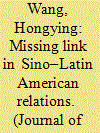

|
|
|
|
|
| Summary/Abstract |
The growing economic presence of China around the world is a widely recognized reality. China's expanding economic relations with other developing countries have generated both positive and negative reactions. Many believe that the increasing economic ties between China and these countries will enhance China's political influence and encourage political cooperation between China and other countries in the Global South. How strong is the economic–political link? This article examines this question in the context of Sino–Latin American relations in recent years. It finds that thus far China's expanding economic relations with the region have not had a significant spillover effect into the political realm. The article provides preliminary explanations of the missing link between the economic and the political. It calls for more nuanced ways to apply familiar international relations paradigms to understanding the implications of the rise of China.
|
|
|
|
|
|
|
|
|
|
|
|
|
|
|
|
| 12 |
ID:
133905
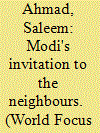

|
|
|
|
|
| Publication |
2014.
|
| Summary/Abstract |
"A resurgent India must get its rightful place in the comity of nations and international institutions. The vision is to fundamentally reboot and reorient the foreign policy goals, content and process, in a manner that locates India's global strategic engagement in a new paradigm and on a wider canvass, that is not just limited to political diplomacy, but also includes our economic, scientific, cultural, political and security interests, both regional and global, on the principles of equality and mutuality, so that it leads to an economically stronger India, and its voice is heard in the international fora.
|
|
|
|
|
|
|
|
|
|
|
|
|
|
|
|
| 13 |
ID:
132510
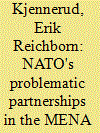

|
|
|
|
|
| Publication |
2014.
|
| Summary/Abstract |
This essay analyzes how the North Atlantic Treaty Organization (NATO) is likely to address the new security environment in the Middle East and North Africa (MENA) region. It investigates how factors internal and external to the alliance shape the possibilities and limits for its ambition to strengthen and develop its regional partnerships in order to enhance security and stability there. NATO's ambitions are likely to be hampered by competing priorities within the alliance, as the as the members are increasingly facing diverging interests and financial austerity as well as domestic political change and regional rivalries in the MENA region.
|
|
|
|
|
|
|
|
|
|
|
|
|
|
|
|
| 14 |
ID:
083369
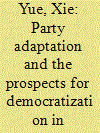

|
|
|
| 15 |
ID:
080076
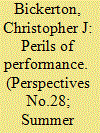

|
|
|
| 16 |
ID:
143212
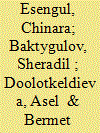

|
|
|
|
|
| Summary/Abstract |
The authors sum up the results of studies of regional cooperation in Central Asia and identify its main positive and negative factors. They assess, in particular, the political, economic, and cultural-humanitarian aspects of the present state of regional cooperation in Central Asia, analyze the problems related to border and water-energy issues, concentrate on the role the Kyrgyz Republic plays in regional cooperation, and point to its most promising trends.
|
|
|
|
|
|
|
|
|
|
|
|
|
|
|
|
| 17 |
ID:
116087
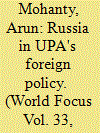

|
|
|
| 18 |
ID:
130597
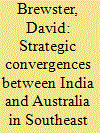

|
|
|
|
|
| Publication |
2014.
|
| Summary/Abstract |
This article will look at strategic convergences between India and Australia in Southeast Asia. It will ?rst examine the development of India's strategic role in Southeast Asia and the trajectory of relations between Australia and India over the last decade or so. it will then consider the convergence of India and Australia's strategic interests in Southeast Asia and review opportunities for strategic cooperation in the region, including in the political diplomatic area and cooperation in maritime security. Finally it will consider the idea of the "lndo-Pacific" as a single strategic region and the potential significance of this for the roles of Australia and India in Southeast Asia.
|
|
|
|
|
|
|
|
|
|
|
|
|
|
|
|
| 19 |
ID:
091071
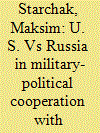

|
|
|
|
|
| Publication |
2009.
|
| Summary/Abstract |
Tajikistan, which has a 1,200-km-long border with Afghanistan, was in demand during Operation Enduring Freedom. At the beginning of 2002, Tajikistan opened its air corridor to NATO's military transport aircraft and 250 French servicemen were deployed at the civilian airport in Dushanbe. The United States was allowed to use the Dushanbe and Kulob aerodromes for deploying its contingents. American congressmen, senators, ministers, and the heads of military departments began paying more frequent visits to the republic.
|
|
|
|
|
|
|
|
|
|
|
|
|
|
|
|
| 20 |
ID:
087620
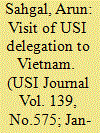

|
|
|
|
|
| Publication |
2009.
|
| Summary/Abstract |
Besides traditional security issues, the Vietnamese side laid greater focus on non-traditional security challenges such as terrorism, drug traffcking and piracy. They also highlighed the issues of clime change, global warming, and food and enery security as more pressing problems.
|
|
|
|
|
|
|
|
|
|
|
|
|
|
|
|
|
|
|
|
|